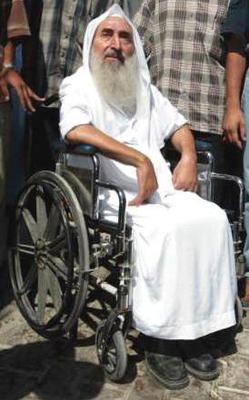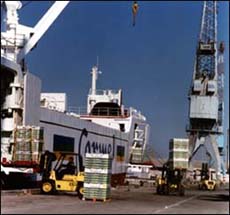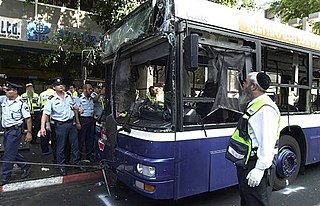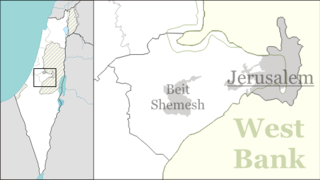Note: This compilation includes only those attacks that resulted in casualties. Attacks which did not kill or wound are not included.

Sheikh Ahmed Ismail Hassan Yassin was a Palestinian politician and imam who founded Hamas, a militant Islamist and Palestinian nationalist organization in the Gaza Strip, in 1987.
Note: The death toll quoted here is just the sum of the listings. There may be many omissions from the list. The human rights organisation B'Tselem has complied statistics of about 600 deaths during 2003 in the occupied territories alone.
Qawasameh tribe, is a major clan primarily based in Hebron, with roughly 10,000 members. Although many of the Qawasmeh were originally pro-peace moderates and supporters of a two-state solution, they were radicalised. One tribe faction, numbering several hundred, dominates Hamas in Hebron and is a radical opposition faction within Hamas, which frequently sabotages Hamas cease fires with bombings and attacks, provoking Israeli retaliation.
A suicide bombing of a crowded public bus in the Shmuel HaNavi quarter in Jerusalem took place on August 19, 2003. Twenty-four people were killed and over 130 wounded. Many of the victims were children, some of them infants. The Islamist militant group Hamas claimed responsibility for the attack.
This page is a partial listing of incidents of violence in the Israeli-Palestinian conflict in 2005.
Numerous attacks were carried out by Palestinians near the French Hill neighbourhood in northern East Jerusalem. The neighbourhood is considered an illegal Israeli settlement by numerous sources but this is disputed by Israel than annexed the area as part of the Jerusalem Law and by others.
The Afula bus suicide bombing was carried out on 6 April 1994, at a bus stop next to an Egged bus in the center of Afula, Israel. Eight Israeli civilians were killed in the attack and 55 were injured. Hamas and PIJ claimed responsibility for the attack.

The 2004 Ashdod Port bombings were two suicide bombings carried out nearly simultaneously on March 14, 2004 at the Port of Ashdod in Ashdod, Israel. As a result, 10 civilians were killed and 16 were injured. Hamas and Fatah claimed joint responsibility for the attack.
Events in the year 2005 in Israel.
Events in the year 2004 in Israel.
Events in the year 2003 in Israel.
Events in the year 2002 in Israel.
Events in the year 2001 in Israel.
The Stage Club bombing was a terrorist attack which occurred on February 25, 2005 in which a Palestinian suicide bomber blew himself up outside the "Stage" beachfront nightclub in Tel Aviv, Israel, killing 5 people and injuring over 50.
Events in the year 2004 in the Palestinian territories.
On 25 January 2002, a Palestinian suicide bomber injured at least 24 civilians in Tel Aviv, Israel. Afterwards, the Islamist Palestinian militant organization Islamic Jihad claimed responsibility.

The Allenby Street bus bombing was a suicide bombing that occurred on September 19, 2002 on a Dan bus in the center of Tel Aviv's business district. Six civilians were killed in the attack and approximately 70 were injured. Hamas claimed responsibility for the attack.

A twin suicide bombing of an Egged bus occurred in the French Hill settlement of northern East Jerusalem on 18 May 2003. Seven passengers were killed in the attack, and 20 injured. A few minutes after the first attack, a second suicide bomber blew himself up at the entrance to the village of Dahiya el-Barid, near Jerusalem. Only the bomber was killed in what appeared to be a premature detonation.

A suicide bombing took place on June 11, 2003, on Egged bus line 14a at Davidka Square in the center of Jerusalem. 17 people were killed in the attack and over 100 people were injured.




